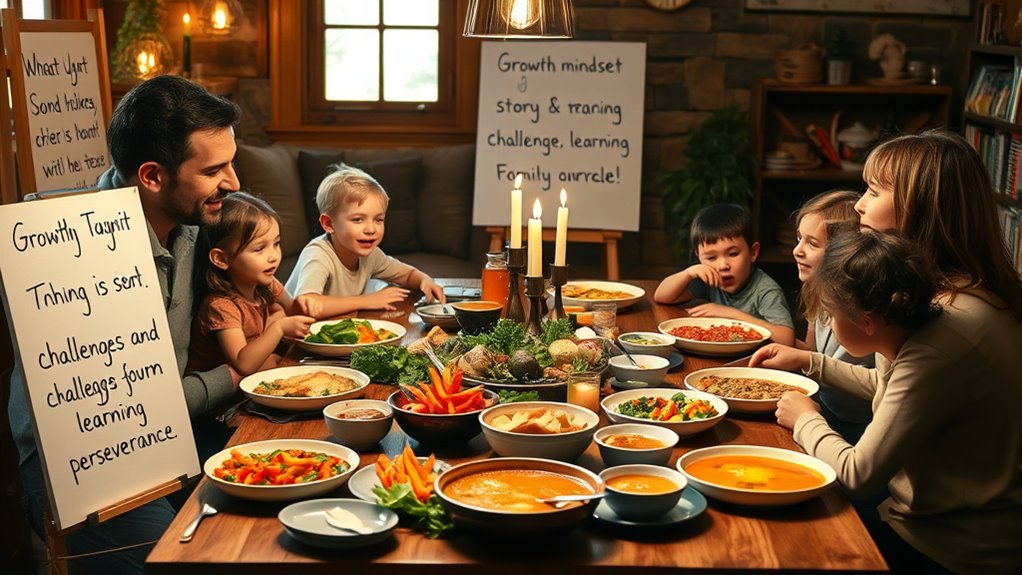At dinner, you can foster a growth mindset by encouraging family members to share recent challenges and how they worked through them. Celebrate efforts and resilience, emphasizing progress over perfection. Create honest conversations about mistakes and setbacks, framing them as learning opportunities. Set small, achievable goals together and track progress as a family. These activities build resilience and a positive attitude toward growth, and if you keep exploring, you’ll discover even more effective ways to nurture a growth mindset at the dinner table.
Key Takeaways
- Share stories of overcoming challenges to promote resilience and growth mindset.
- Engage in reflection and problem-solving activities involving puzzles or lessons learned.
- Praise effort and perseverance in trying new skills or tackling difficulties.
- Have honest conversations about mistakes, viewing failures as growth opportunities.
- Set and review small, achievable goals to encourage continuous progress and resilience.

Have you ever wondered how to foster a mindset that embraces challenges and learning? One effective way is through growth mindset activities during dinner conversations. This time is perfect for encouraging discussions that help you and your family develop resilience strategies and a positive attitude towards learning challenges. Instead of sticking to routine questions, you can steer the conversation toward stories of overcoming difficulties, emphasizing effort and perseverance. When everyone shares recent struggles at work or school and how they tackled them, you model resilience strategies that promote growth. These stories show that setbacks are temporary and part of the learning process, helping everyone see challenges as opportunities rather than obstacles.
Sharing stories of overcoming challenges at dinner encourages resilience and a growth mindset in the whole family.
You can also introduce simple activities that make learning challenges seem less intimidating. For example, ask family members to describe a time they faced a tough problem and what they learned from it. This encourages reflection and highlights the importance of persistence. As each person shares, you reinforce the idea that effort leads to progress, which is central to cultivating a growth mindset. You might also challenge each other with quick problem-solving activities—like riddles or puzzles—then discuss how they approached the task and what they learned from the experience. These exercises demonstrate that struggle is an essential part of growth and that trying different strategies can lead to success. Additionally, understanding the importance of learning strategies can help family members develop more effective approaches to challenges.
Furthermore, you can create a supportive environment by praising effort rather than innate ability. During dinner, recognize family members’ attempts to learn something new or improve their skills, regardless of the outcome. For example, if someone tries a new hobby or tackles a difficult project, celebrate their initiative. This reinforces that effort and resilience matter more than immediate results, helping everyone build a growth mindset. Moreover, understanding that learning challenges are an integral part of growth can help demystify setbacks and foster a culture of perseverance. Research shows that electric bikes and other innovative tools are often used to support active lifestyles, which can also be a metaphor for embracing challenges in personal development. Encourage honest conversations about mistakes and setbacks, emphasizing that failures are stepping stones rather than defeats. Sharing personal stories of overcoming learning challenges can foster a sense of shared resilience and motivate others to keep trying.
Finally, make it a habit to set small, achievable goals at dinner, like trying a new activity or improving a skill. Discussing progress and setbacks related to these goals can strengthen resilience strategies and help everyone develop a growth-oriented perspective. For example, you could introduce a goal-setting activity that encourages continuous improvement. Over time, these dinner conversations become a natural way to embed growth mindset principles into daily life. By consistently focusing on effort, learning challenges, and resilience strategies, you create a supportive environment that nurtures growth mindset in everyone at the table. This approach not only enhances individual development but also builds a family culture that values perseverance, learning, and continuous improvement.
Frequently Asked Questions
How Can I Encourage My Child to Embrace Challenges During Dinner?
To encourage your child to embrace challenges during dinner, praise their effort rather than just outcomes. Share stories of your own struggles and how you overcame them, modeling resilience. Ask questions that prompt them to think about solutions and celebrate small victories. This approach helps your child see challenges as opportunities to grow, fostering a growth mindset. Keep the conversation positive and supportive to build their confidence and willingness to take on new challenges.
What Are Simple Growth Mindset Activities Suitable for All Age Groups?
You want simple growth mindset activities for all ages, so try celebrating failures and sharing successes during dinner. Encourage everyone to talk about challenges they faced and what they learned, emphasizing that setbacks are learning opportunities. By openly discussing both failures and wins, you foster resilience and positivity. This creates an environment where growth is celebrated, making it easy for all ages to develop a growth mindset naturally.
How Often Should These Activities Be Incorporated Into Mealtime?
Research suggests that consistent routines enhance learning and emotional growth. Incorporating growth mindset activities into your mealtime routines can be highly effective, but how often depends on your family’s schedule. Aim for daily reflection during dinner, making it a special time for sharing achievements and challenges. This regular practice fosters resilience and positivity, helping everyone develop a growth mindset. Adjust frequency as needed to keep it meaningful yet manageable.
Are There Any Common Mistakes to Avoid When Practicing Growth Mindset at Dinner?
When practicing a growth mindset at dinner, avoid negativity by focusing on solutions rather than problems. Don’t praise innate talent; instead, praise effort and perseverance. Be mindful not to set unrealistic expectations, which can discourage progress. Encourage open conversations about challenges, emphasizing learning from mistakes. This approach helps foster resilience and motivation, making mealtime a positive environment for growth and improvement.
How Can I Make Growth Mindset Discussions More Engaging for My Family?
Talking about growth mindset at dinner is like opening a treasure chest—you never know what learning gems you’ll find. You can make discussions more engaging by encouraging your family to celebrate failures as learning opportunities and share successes to boost confidence. Ask open-ended questions and create a safe space for honest conversations. This keeps everyone invested, making growth mindset a natural and exciting part of your family’s dinner routine.
Conclusion
By incorporating growth mindset activities into your dinner routine, you can foster resilience and a love for learning in yourself and your family. Why not turn mealtime into a chance to celebrate progress and embrace challenges together? With simple conversations and activities, you create an environment where everyone feels encouraged to grow and improve. So, why not start tonight and see how small changes can lead to big personal growth?










